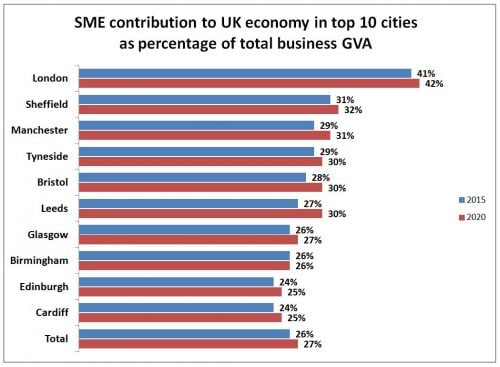The contribution that small and medium enterprises (SMEs) in the United Kingdom make to the nation’s economy is set to rise to £217 billion by 2020.
So concludes new research from the Hampshire Trust Bank, carried out in collaboration with the Centre for Economics and Business Research (Cebr).
Mark Sismey-Durrant, the bank’s chief executive, says:
“Our report demonstrates the critical importance of SMEs as the engine room of the economy.”
 Over three-quarters of UK businesses do not employ anyone aside from the owner. Image: pixabay
Over three-quarters of UK businesses do not employ anyone aside from the owner. Image: pixabay
The new research forecasts that of the total contribution that business makes to the UK economy – in terms of gross value added (GVA) – SMEs will account for 27 percent in 2020, up 1 percent from 2015.
GVA and SMEs
GVA is used by economists to assess the contribution that a sector or industry makes to the UK economy. It is related to gross domestic product (GDP) via the formula: GVA + taxes on products – subsidies on products = GDP.
Small and medium enterprises (SMEs) are firms that employ fewer than 250 people. According to government figures, at the start of 2015, the vast majority (99.9 percent) of UK private sector firms were SMEs.
The majority of firms in the UK are at the very small end of the SME sector. In 2015, there were 1.3 million businesses employing workers other than the owner – but another 4.1 million employing nobody aside from the owner. This means over three-quarters of businesses in the UK do not employ anyone aside from the owner.
Top 10 cities with SMEs contributing to UK economy
The new report names the top 10 cities by SME added value to the UK economy. In this article value added refers to an industry’s (SME’s) contribution to total GDP.
These are: London (home to 444,880 SMEs in 2015), Manchester (51,995), Birmingham (29,520), Leeds (26,280), Tyneside (19,830), Bristol (17,280), Edinburgh (16,635), Glasgow (16,630), Sheffield (14,555), and Cardiff (14,380).
The report highlights a number of points about the top 10 cities, for instance:
– The number of SMEs in the top 10 cities will increase by 20 percent during 2015-2020 – from a total of 651,985 to 785,013
– London will continue to be home to the largest number of SMEs in 2020, with contributions to the UK economy forecast to rise from £149bn in 2015 to £164bn in 2020
– However, the cities forecast to have the fastest growing economic contributions during 2015-2020 are Manchester (15 percent growth), Leeds (15 percent), and Bristol (14 percent)
 Data from: Hampshire Trust Bank/Cebr
Data from: Hampshire Trust Bank/Cebr
Sectors driving SME growth
The report gives a snapshot of the sectors that are driving SME growth in the UK.
It says the research shows the professional and administrative services sector – for instance legal and accountancy firms – employs the highest percentage of people in SMEs in each of the top 10 cities.
In London, the professional and administrative services sector currently accounts for 28 percent of all SME jobs.
Four other sectors are also driving SME growth. These are: wholesale and retail; public administration,
education and health; hospitality (hotel and food services); and manufacturing.
Nina Skero, managing economist at Cebr, says:
“This study demonstrates there is a positive story to be told about the UK’s SMEs and it is encouraging to see such strong growth being mirrored outside of the capital.”
She says they expect the size of SME added value in the UK’s economy will increase in coming years, and hopes their findings will spur UK business leaders to invest in their growth.

